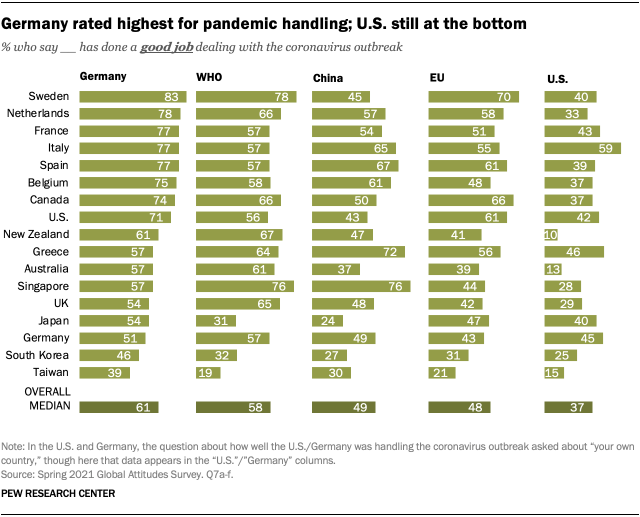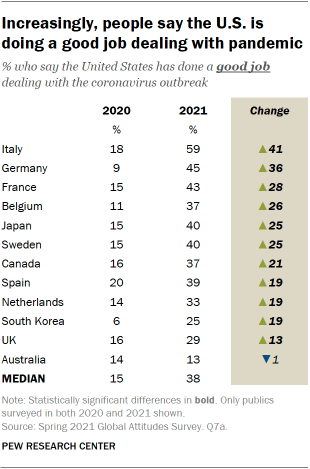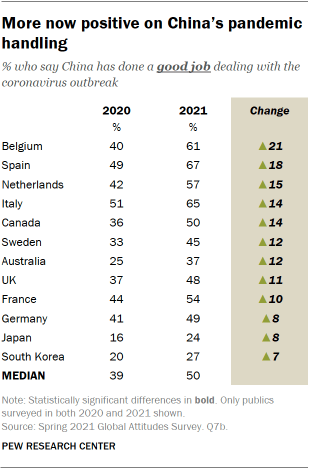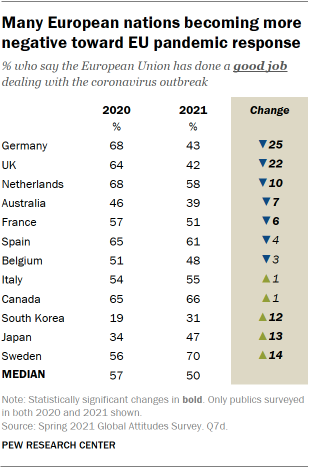
As several coronavirus vaccines have become available in many parts of the world, the pandemic is still far from over for most of the globe. How nations have handled COVID-19 remains a controversial issue, and a new Pew Research Center survey of 17 advanced economies shows mixed assessments for how well many of the major players developing and distributing vaccines have responded to the pandemic.
A median of just 37% think the United States has done a good job, and in all but Japan, Germany and Italy, the U.S. is the lowest rated among the five countries and organizations asked about in the survey.
While the U.S. receives relatively poor marks compared with other countries and organizations when it comes to dealing with the coronavirus outbreak, favorable assessments of the U.S. response increased significantly in nearly all of 12 countries surveyed in both the summer of 2020 and 2021. (Data from the U.S. in 2020 is omitted due to mode changes.) In 2020, a median of 15% across these 12 countries said the U.S. had done a good job dealing with the outbreak, compared with 38% who say the same this year.
This analysis focuses on public attitudes toward how the U.S., China, Germany, European Union and World Health Organization have handled the coronavirus pandemic. For this post, we conducted nationally representative surveys of 16,254 adults from March 12 to May 26, 2021, in 16 advanced economies. All surveys were conducted over the phone with adults in Canada, Belgium, France, Germany, Greece, Italy, the Netherlands, Spain, Sweden, the UK, Australia, Japan, New Zealand, Singapore, South Korea and Taiwan. The overall findings include trend analysis of the 12 countries surveyed in both 2021 and the summer of 2020.
In the United States, we surveyed 2,596 U.S. adults from Feb. 1 to 7, 2021. Everyone who took part in the U.S. survey is a member of the Center’s American Trends Panel (ATP), an online survey panel that is recruited through national, random sampling of residential addresses. This way nearly all adults have a chance of selection. The survey is weighted to be representative of the U.S. adult population by gender, race, ethnicity, partisan affiliation, education and other categories.
To account for the fact that some publics refer to the coronavirus differently, in South Korea, the survey asked about the “Corona19 outbreak.” In Japan, the survey asked about the “novel coronavirus outbreak.” In Greece, the survey asked about the “coronavirus pandemic.” In Australia, Canada, New Zealand and Taiwan, the survey asked about the “COVID-19 outbreak.” All other surveys used the term the “coronavirus outbreak.”
Here are the questions used for the report, along with responses. See our methodology database for more information about the survey methods outside the U.S. For respondents in the U.S., read more about the ATP’s methodology.
The change is largest in Italy: Just 18% said the U.S. was handling the pandemic well in 2020, while 59% feel favorably toward the U.S. response now, an increase of 41 percentage points. Double-digit increases are present across 10 additional countries surveyed in both years. However, Australians’ opinion on the U.S. handling of the pandemic has remained stable: 14% said the country was doing a good job in 2020, versus 13% who hold that opinion this year.

Germany receives the highest ratings for its handling of the pandemic. Across 17 publics, a median of 61% say that Germany has done a good job dealing with the coronavirus outbreak. By contrast, a median of 48% say the EU as a whole has done well on that front.
In most of the advanced economies surveyed, the World Health Organization (WHO) is rated highly for its coronavirus response, with most respondents in Europe, the U.S., Canada, Australia, New Zealand and Singapore saying its response has been good. However, the WHO is not universally well-regarded for its coronavirus response, particularly in Asia: Only about three-in-ten in South Korea and Japan and two-in-ten in Taiwan say the WHO has done a good job.
A median of 49% give China positive marks, but opinions about China’s response to the pandemic range widely. For example, large shares in Singapore (76%) and Greece (72%) say China has done a good job, but only about a quarter in Japan and South Korea hold that view.
Just as they have for the U.S., assessments of how China has handled the pandemic have become more positive in the past year. In the 12 publics surveyed both in summer 2020 and spring 2021, shares saying China has done a good job dealing with the coronavirus outbreak have increased across the board, including double-digit increases in nine countries. In Belgium, for example, 40% in 2020 said China had done a good job handling the pandemic; now, 61% hold this opinion, a 21-point increase.
In three Asia-Pacific nations – Australia, Japan and South Korea – the shares saying China has done a good job have increased, but fewer than half consider China’s pandemic performance in a positive light.
The European Union, which has recently experienced a third wave of cases and issues with vaccine distribution, now garners less approval for its handling of the pandemic than it did last summer, with many of the negative changes coming from European nations. The decline is most stark in Germany, where positive views of the EU’s response have fallen 25 points since 2020. Likewise, the share of British adults saying the EU is doing a good job has dropped by about a third. (The EU and UK tussled over export restrictions on the AstraZeneca vaccine earlier this year.)
However, positive assessments of the EU in Sweden have increased by 14 points to 70% – its highest rating in the survey. And elsewhere, South Korea and Japan are both increasingly positive toward the EU’s handling of the pandemic, up by 12 and 13 percentage points, respectively.
Note: Here are the questions used for this analysis, along with responses, and its international methodology, U.S. methodology, and full dataset.







